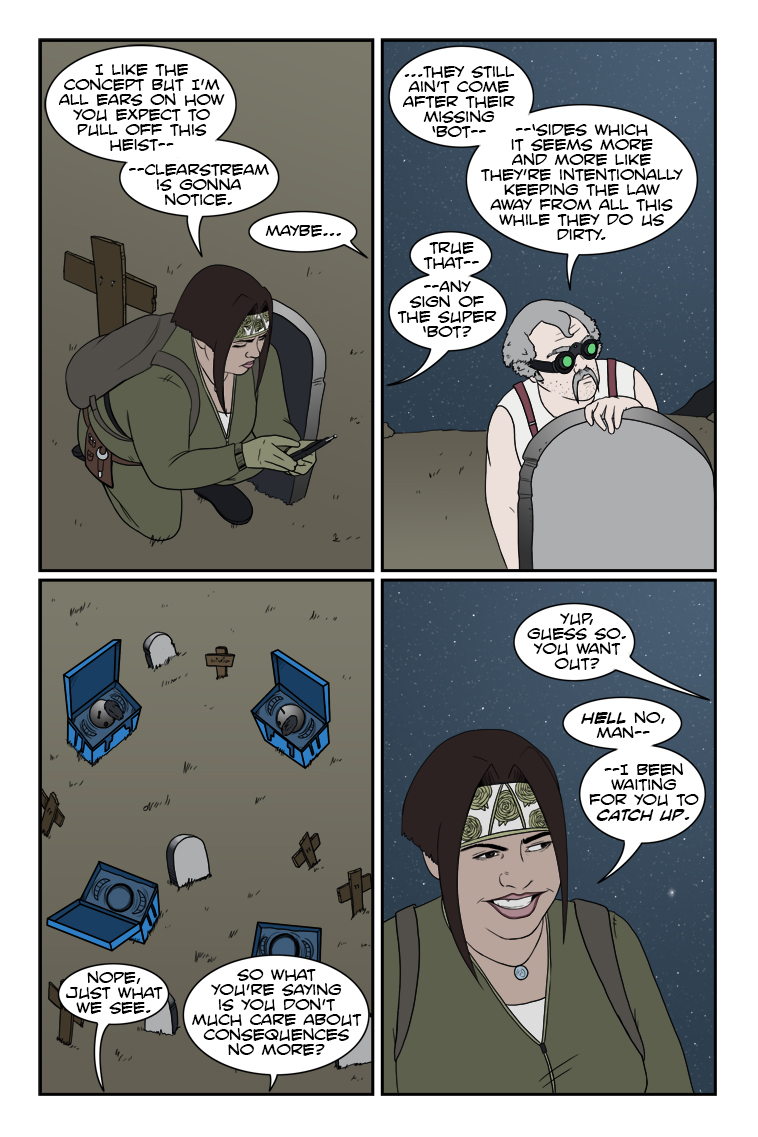Cart
Product categories
Support Us!
If you like what I do please support us on Ko-fi or Patreon.
Follow Us!
Join Our Newsletter!
Vote For Us!
Login
Polls
Events
-
Pasadena Comic Con
Dates: May 24
Location: Pasadena Convention Center, 300 E Green St, Pasadena, CA 91101, USA ( MAP)Details:We will be at the Pasadena Comic Con on January 26th. See some of you there for this one day event!
Purchase tickets online at here: https://www.tixr.com/groups/pcc/events/pasadenacomiccon-pasadena-comic-con-2025-115248
-
San Diego Comic Con: SP-N7
Dates: Jul 23 - 27
Location: San Diego Convention Center, 111 Harbor Dr, San Diego, CA 92101, USA ( MAP)Details:Clint & Dawn Wolf will be at San Diego Comic Con, as Lab Reject Studios. We will be at booth N7 in Small Press.









9 thoughts on “542 – Catching Up”
Keith
Some friction, but yeah. IRL, I’d like these two…they should have kids. 😉
Dawn
I might have to draw out what their kid would look like. First thought is that their kid would look like Ongo Gablogian from “It’s Always Sunny In Philadelphia”
Scarsdale
He’s pushing 60, she’s maybe 30, more likely less. Chuck is most likely shooting blanks, and besides, he’s talking to her like a baby sister than a love interest.
Keith
Up in these hills, sometimes family is all y’gots. 😉
ConcordBob
It is really hard to have a favorite character, as there are so many good ones. But I think Rosa is my favorite. Chuck is a good accomplice in sneaking work, but not much for romance. Uugh.
Otaku
I mean, if they don’t have at least an inkling of what’s going down, I’m actually disappointed in Clearstream. If anything, I’m starting to wonder if they caught on and realized “Wait, we can use this.”
Because of course they can. 😉
Dr. Norman (not a real doctor)
I’m way ahead of you – I’ve been waiting for you to catch up. From November 2020:
I would hope for nothing less – her and Chuck have the potential for a great deal of positive mischief.
Speaking of which, I received the email notifying me that my order for the NSFW “Chuck and Rosa Finally Do It” (age verification required) limited edition hardcover is going to be delayed due to the pandemic. I think it’s really cool that you’ll be adding some additional stretch goal goodies when it ships – thanks for all your story and art.
As for the inscription, ” We owe it all to you ” will be sufficient.
Crazyman
Partners in crime! 😈
TKG
A crime so perfect she went full on wall-eye!
Latest Comics
#304. 292 – Pointing The Finger
12 Apr 20, 2016
#303. 291 – Informed Decisions
18 Apr 13, 2016
#302. 290 – Omission Briefing
13 Apr 06, 2016
#301. 289 – Gut Feelings
11 Mar 23, 2016
#300. 288 – Dawning Unease
14 Mar 16, 2016
#299. 287 – Radio Interference
15 Mar 09, 2016
#298. 286 – Discussing The Stakes
12 Mar 02, 2016
#297. 285 – Couched In Deception
13 Feb 24, 2016
#296. 284 – Destructive Reasoning
18 Feb 17, 2016
#295. 283 – Itchin’ For Action
14 Feb 10, 2016
#294. 282 – Second Looks
14 Feb 03, 2016
#293. 281 – Let Sleeping Suzies Lie
15 Jan 27, 2016
#292. 280 – Canaries In The Coal Mine
31 Jan 20, 2016
#291. 279 – Pause For Concern
49 Jan 13, 2016
#290. 278 – Night’s Watch
28 Dec 23, 2015
#289. 277 – True Romance
12 Dec 16, 2015
#288. 276 – Bathroom Humor
14 Dec 02, 2015
#287. 275 – Mostly Harmless
10 Nov 25, 2015
#286. 274 – That’s Entertainment
14 Nov 18, 2015
#285. 273 – All Part Of God’s Plan
50 Nov 11, 2015
Latest Chapters
Episode 22
Episode 21
Episode 20
Episode 19
Episode 18
Episode 17
542 – Catching Up
Now you're getting the idea, Chuck!
Hatari!
Calendar
BlueSky Latest Posts
Writer’s Blog Archives